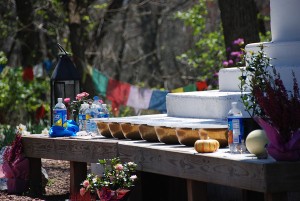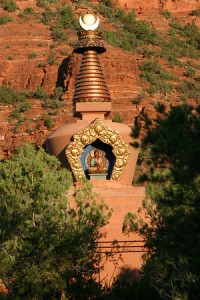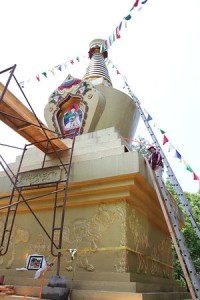
The following is an excerpt from a teaching by Jetsunma Ahkon Lhamo called “The Lama Never Leaves”
Now, we have these amazing stupas. How amazing! Even when the lamas are not here, we have this occurrence of the living Buddha here on this property. The living Buddha remains on this property. The problem is that our mind is so deluded and so lacking in wisdom that we don’t see that. We let the Buddha sit there with no company. Not that they need company, but we need them. Rarely do we go and visit the Buddhas. Rarely do we make them offerings. Rarely do we offer them a little cleaning, you know, to take a little cloth and say, ”Even though the Buddha doesn’t need to be cleaned, may I offer you this. May I take this dirt from you. And by that merit, may all sentient beings be free of suffering.” We don’t do that because we’ve forgotten. Because we go to sleep in our minds whenever our living lama is not around to shake us awake.
The teaching that I want to give to you today is how to avoid that. First of all, let me tell you the way that Asian cultures, particularly Tibetans (I can speak for them), that have stupas, chortens, available in their land, normally incorporate them into their lives. Usually once a year, around the time of New Years, Losar, there are certain days when one does religious activity and that religious activity is increased by 100,000 or 10,000. And of course, we have our 10,000,000 days where we look to accomplish a great deal of practice. Tibetans always think of times like that as a very joyful occasion, particularly during Losar, a time to celebrate. They all get out and the wealthier patrons (by the way, that’s how they get to be wealthy) buy the gold wash or the white wash or whatever color they are going to repaint the stupas with. They clean the stupas and give them a fresh coat of gold or white wash. And that’s a very joyful thing because they realize how much merit they are accomplishing, and they are already, because of their confidence, enjoying the fruits of that. Because of their confidence!
We’re saying, “Boy, when’s it gonna happen?” And they’re saying, “I rejoice in my future merit. By this merit, there will be plenty of clothing, I will be warm and comfortable. All sentient beings will be pleased and this is tremendous. I am so happy about that.” And so with the simplicity of just the joyful accomplishment, they are able to experience the happiness right away. It’s like a festival. After they finish doing that, there’s always a lovely dinner; and maybe the great patrons will offer a beautiful dinner for the Sangha. And there is always a beautiful tsog offered to the Buddhas and the Bodhisattvas. It’s a gathering of the Sangha and the Lamas and all the people that is extremely joyful. Because we all say, “By this merit, may we never be separated,” it becomes a very joyful event. And so, of course then, the stupas are living Buddhas that are brought into the occasion because they are washed, they are cared for. We offer great offerings to them—of course the eight auspicious offerings of water to drink, water to bathe in, all the different offerings and their different meanings. We make offerings of food and butter lamps or candles. Sometimes Tibetans will make Mani rocks—write the Mani mantra on rocks and offer many of those. So there are many things that the Tibetans do during that time to celebrate and to incorporate the stupas as living beings in their lives.
Plus, the Tibetans that care for stupas would not think of letting the sun rise without offerings being present on the stupas. To let the sun rise without these offerings would be unthinkable. That would be, in the way Tibetans have been taught, in the way that they teach us, that would be like if your Root Guru had spent the night outside and was cold and hungry and needed her attendants or his attendants to come and no one brought him any tea to warm him. It would be like that. Would you do that to your Root Guru? Even before you took your own coffee in the morning, wouldn’t you bring your Guru his tea? I certainly would. I certainly would.
What does that say if we have our own coffee in the morning before we make an offering to the Buddha. That says ‘my ego is more important.’ That says, ‘I take refuge in me’ or ‘I take refuge in my coffee,’ which I know is not hard to do. Of course, we don’t all of us live with the stupas, and so each in our own way, in our homes, maintain altars and, hopefully, we make offerings to the Buddhas before we take any offering ourselves.
Traditionally, lamas have a little cup. It looks like a protector cup but it’s not exactly. It’s a little tiny cup, and it has a removable top that you can turn over. A lot of times the lamas will take their first tea of the morning and offer it in the little top and put it up on the altar for the Buddhas. Such a simple gesture but so beautiful. And so profound. To do that every day of one’s life is quite beautiful. Some have the custom that whenever a family gathers for a big meal, the Buddha always gets the first portion. Perhaps for the Sunday meal here at the temple, we can make the first portion and give it to the stupa outside. Or in a home family situation, the householder family can celebrate their lives together as Buddhists by creating a meal, whether it’s an ordinary family meal or whether it’s Hanukkah or whether it’s Easter or whether it’s Christmas and offering the first portion to the Buddhas. That’s the way that a householder practices.
We should always think of the objects of refuge as being so sacred to us that we care for them very mindfully, so mindfully that we, through thought, word, and deed, indicate to ourselves in our own practice and also to all sentient beings, that our caring is such that our eyes are opened. Spiritually our eyes are open and we see the preciousness and the value of the objects of refuge. We recognize their exquisiteness and extraordinariness and how much more important they are than our own phenomena.
Copyright © Jetsunma Ahkon Norbu Lhamo All rights reserved




